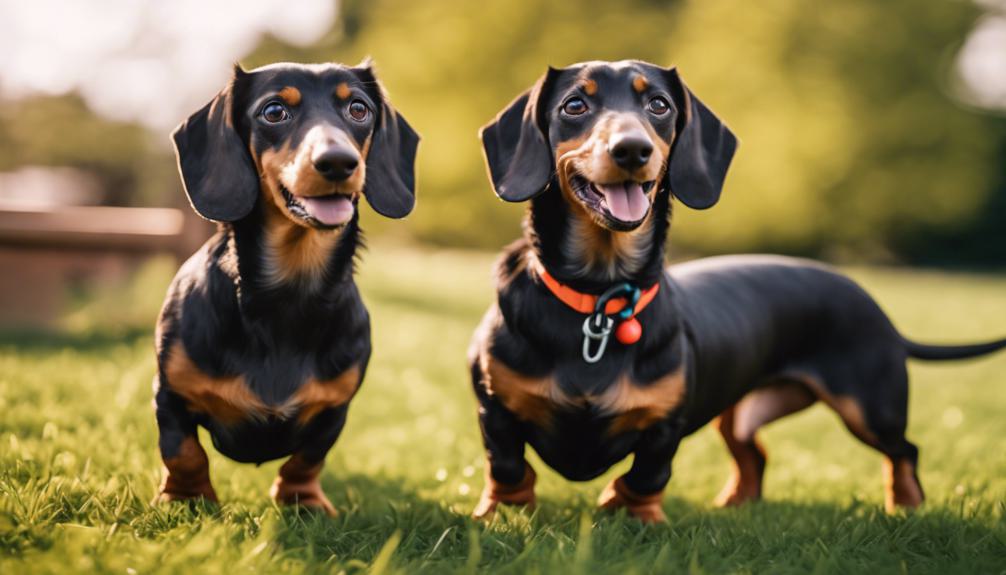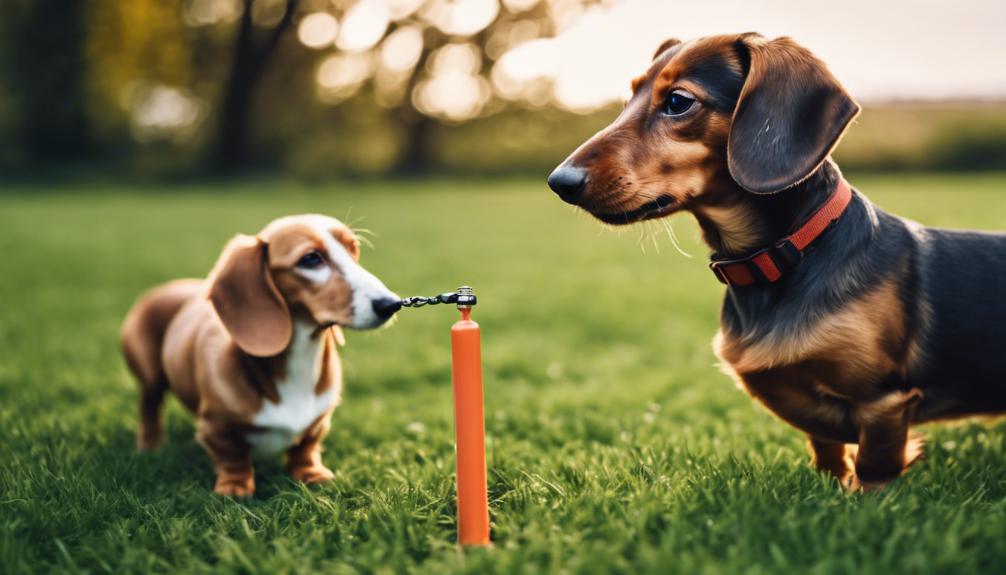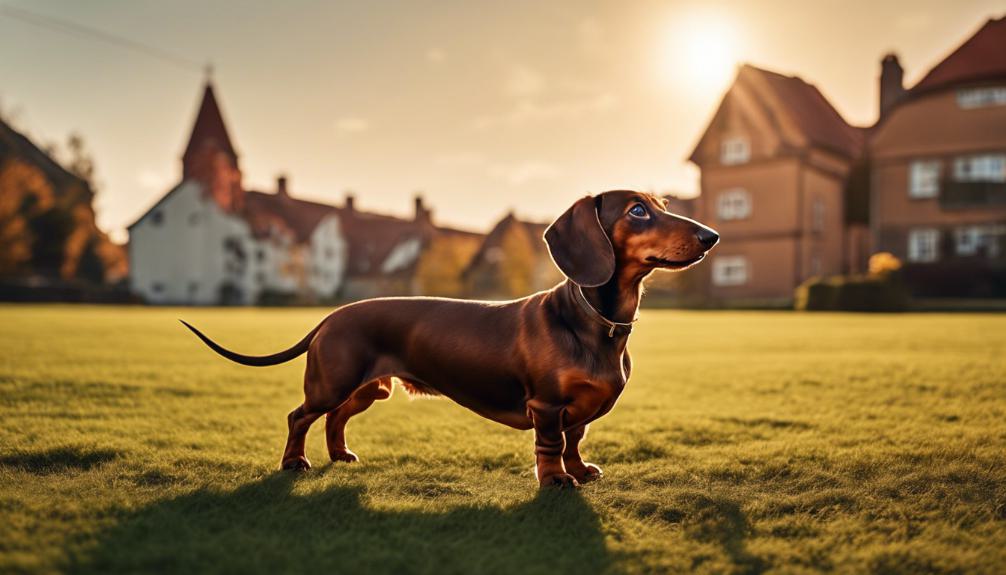Dachshund Dog Breed: History, Personality Traits, and Care
Dachshunds, originally badger hunters in Germany, morphed into beloved companions noted for their courage and distinctive look. Despite being small, they’re vivacious, protective, and have tenacious hunting instincts. They’re easily distracted by scents and can be stubborn, requiring positive, consistent training methods. Their love for digging and chasing, combined with their physique, requires careful exercise to avoid back problems. Grooming varies by coat type, from weekly brushing for smooth coats to daily for longhaired ones. Managing their weight is essential and a well-fenced yard is recommended. Sticking around, you’ll uncover more about nurturing Dachshunds.
Dachshund Breed Origins
Delving into the origins of the Dachshund breed, you’ll find their roots firmly planted in Germany, where they were meticulously bred for their unique badger hunting capabilities. Their name, deriving from the German ‘dachs’ for badger, reflects this historical purpose.
Originally, Dachshunds descended from the schweisshund, a hunting hound renowned for tracking. To enhance their hunting prowess, they were crossbred with terriers and spaniels, resulting in various coat types. Each type was uniquely suited to different hunting conditions and prey.
Over the centuries, Dachshunds transformed from hunting dogs, burrowing into badger dens, to beloved companions and versatile working dogs. Their distinctive look and hunting spirit have made them enduringly popular.
Unraveling Dachshunds History
Let’s journey back to 15th-century Germany, where Dachshunds began their evolution from expert badger hunters to cherished household pets. Initially, they were fearless hunting dogs, ferociously chasing down badgers into their burrows. Their courage and tenacity soon found favor in European royal courts, elevating their status.
Later, in 1885, the AKC officially recognized the breed in the U.S. However, the world wars led to a popularity decline for Dachshunds due to their German heritage. Yet, these resilient dogs bounced back post-WWII. By the 1950s, they’d regained their reputation and are now the sixth most popular dog breed in the U.S. So, despite a tumultuous history, Dachshunds have emerged as beloved companions.
Decoding Dachshund Personality Traits

When it comes to grasping Dachshunds, you’ll quickly realize they’re lively, alert, and full of personality, surprising many with their protective instincts despite their small stature. These comic dogs also have a strong personality, often playing the role of protectors in their homes. Their love for digging and chasing is a testament to their undying hunting instincts.
However, it’s essential to approach their training positively as they can be easily distracted by scents. Their enthusiasm for activities, while admirable, can lead to back problems, especially if they engage in sports involving jumping. So, while enjoying their spirited, loveable antics, make sure to care for their health too.
Indeed, comprehending a Dachshund requires acknowledging their vibrant character along with their physical needs.
Essential Dachshund Care Guidelines
Properly caring for your Dachshund involves understanding their unique needs, from their stubborn yet intelligent nature that requires positive training methods, to the importance of regular exercise and weight management, not forgetting the varied grooming needs based on their coat type.
Regular walks and exercise are essential to maintain a healthy weight, preventing back issues like intervertebral disc disease (IVDD), a condition affecting about 25% of Dachshunds. It’s important to provide proper nutrition for best health. Grooming requirements vary; for instance, longhaired Dachshunds need more frequent brushing.
Always remember, your Dachshund’s care isn’t just about their physical well-being, but also about nurturing their intelligent, yet stubborn nature, with positive reinforcement. Your attention to these care guidelines will ensure a happy, healthy Dachshund.

Exploring the grooming needs of your Dachshund can seem like a maze, given their specific coat types and unique grooming requirements. The table below offers a simplified guide:
| Coat Type | Grooming Needs |
|---|---|
| Smooth Coat | Weekly brushing with a soft-bristle brush |
| Longhaired Coat | Daily brushing and combing with a stiff-bristled brush |
| Wirehaired Coat | Frequent brushings with a wire-bristle brush |
The Exercise Demands of Dachshunds
After ensuring your Dachshund is well-groomed, it’s equally important to understand their exercise needs. Due to their hunting background, Dachshunds are active, inquisitive hounds that require daily walks. This physical activity not only keeps them healthy but also provides the mental stimulation they crave.
While they love digging and chasing, remember not to involve them in exercises with jumps to avoid back problems. Their unique body structure is prone to such issues. Regular exercise is also crucial for obesity prevention.
While their built-for-terrain physique mightn’t be suited for long, sustained periods of exercise, a good romp followed by a nap is just their style. Meeting these exercise demands will keep your Dachshund both happy and healthy.
Training Your Dachshund Effectively

Despite their intelligence, training your Dachshund effectively can be a challenge due to their stubborn nature, so it’s crucial to use positive reinforcement methods. Consistent training, mixed with rewards, helps manage their tenacious nature and curb behavioral challenges.
Remember, a fenced-in yard is great for training and prevents them from running off due to their innate prey drive. Regular physical activity is key; moderate walks twice a day can help prevent obesity. But be cautious to avoid strain on their backs and knees due to their unique body structure.
Ultimately, training methods that promote positive behavior, provide ample physical activity, and guarantee their safety will lead to a well-trained Dachshund.
Frequently Asked Questions
What Is a Dachshund Personality Trait?
You’re asking about a Dachshund’s personality traits. They’re lively, alert, and protective, with a comic side. Despite their size, they’re great watchdogs, but they can be dominant and aggressive towards small animals without proper training.
What Is the History of the Dachshund?
You’re curious about the Dachshund’s history. Originating in Germany, they were bred for hunting, specifically badgers. Their name even means ‘badger dog’ in German. Despite their short legs, they’re versatile hunting and companion dogs.
What Are the Pros and Cons of Dachshunds?
You’ll find Dachshunds are loving, playful, and excellent watchdogs. However, they can be dominant, not mix well with small pets, and dig excessively. They’re alert but might bark a lot, and can live 12-16 years.
What Traits Are Selected for a Dachshund?
You’re wondering about Dachshunds’ traits. They’re chosen for determination, intelligence, and courage, used to hunt badgers. Their short legs, elongated bodies, keen smell, and strong prey drive are all essential traits. They’re also alert, loyal, and protective.
Conclusion
So, you’ve journeyed through Dachshund history, decoded their unique personality, and mastered their care requirements.
Remember, grooming and exercise are essential for this breed, but training should top your list. These little dogs have big hearts and minds, and with patience, you’ll foster a well-mannered companion.
Embrace the challenge – you and your Dachshund will create a bond that’s as strong and enduring as their lineage. After all, that’s the Dachshund way!

